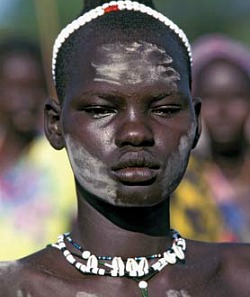 The Republic of South Sudan or "South Sudan" for short, is a landlocked country located at the North-eastern part of Africa (more precisely, the East-Central Africa region of Northeastern Africa) just at the south of the Republic of 'North' Sudan.
The Republic of South Sudan or "South Sudan" for short, is a landlocked country located at the North-eastern part of Africa (more precisely, the East-Central Africa region of Northeastern Africa) just at the south of the Republic of 'North' Sudan.
The Republic of South Sudan also shares borders with the Republic of Ethiopia to the east, the Republic of Uganda to the south, the Republic of Kenya to the southeast and the Democratic Republic of Congo to the Southwest.
The Republic of South Sudan covers a total land area of about 619,745sq km (about 15% of which is covered by the vast swamp region of the Sudd formed by the White Nile. The sudd or the "Bahr al Jabal" is one of the largest wetlands in the world).
The Republic of South Sudan gained independence (from "Sudan") on July 9, 2011.
The Republic of South Sudan has an "estimated" population of 13 million people with the population growth rate hovering around 2.7%. About 22% of South Sudan's population lives in urban areas in major cities and towns such as Juba the capital, Yei, Aweil, Malakal, etc. Juba the capital of South Sudan contains about 300,000 people. The remaining 78% lives in rural and sub-urban areas mostly as poor subsistence farmers who grow crops and rear animals just to feed themselves and their families.
Although all religions are welcomed in South Sudan, the Republic of South Sudan is mostly a Christian-Animist blend.
South Sudan is one of the most culturally rich countries in all of Africa with a beautiful blend of several ethnic and racial groups. Murle, Mandari, Didinga, Ndogo,Dinka, Kakwa, Bari, Lango, Dungotona, Azande, Shilluk, Kuku, Bviri, Lndi, Anuak, Bongo and Acholi are some of the major ethnic groups living in South Sudan today.
Although English is the official language, Arabic, Nuer, Bari, Zande, Dinka, Shilluk, and several other local languages are spoken in South Sudan today.
The Republic of South Sudan is blessed with abundance of natural resources such as gold, diamonds, petroleum, silver, iron ore, chromium ore, zinc, mica, hydropower, limestone, copper, hardwoods, fertile agricultural land, etc.
However, despite the abundance of Natural resources, the new Republic of South Sudan remains one of the poorest countries in the world with over 60% of it's population living below the international poverty line ($1.90 a day). Sadly, South Sudan has become a war-torn country and the situation keeps deteriorating by the day. According to statistics, even before the current conflict, over 35% of South Sudanese children under the age of 5 were underweight, which is one of the worst cases of child malnutrition in the world.
South Sudan has one of the worst transportation infrastructure in the world. In fact, over 60% of South Sudan is inaccessible by road especially during the rainy season. This affects every sector of the economy. Take agriculture for example. Some farmers are not able to transport their farm produce to the market centers and perishable goods (like onions, tomatoes, etc.) just go waste. Also, several people die from curable diseases (especially in the small towns and villages) due to lack of transportation.
South Sudan has a literacy rate of just 27% for the total population and 16% for the female population. In other words, just about 27% of the total population of South Sudan above age 15 can read and write. Also, just about 16% of the total female population above age 15 can read and write which is one of the worst literacy rates in Africa today. Instead of using the oil money to improve education and other sectors of the economy, money from oil proceeds end up fueling wars and conflicts in South Sudan.
The Republic of South Sudan remains one of the HIV/AIDS killing zones in the world with adult prevalence rate of 3.1%. Besides the deadly HIV/AIDS, dengu fever, meningococcal meningitis, bacterial and protozoal diarrhea, African trypanosomiasis popularly known as "sleeping sickness", rabies, hepatitis A and E, typhoid fever, etc., continue to threaten several lives in South Sudan today.
The long years of bloody conflicts have destroyed a lot in South Sudan. Sadly, there seems to be no end to the numerous clashes. Over 3 million people have been forced out of their homes. Some have fled to neighboring countries and having lost thier livelihoods, almost all of them need shelter, food and medical assistance.
Just like in most other African countries today, corruption and poor governance continue to tear South Sudan apart. Almost every leader in South Sudan today is corrupt in one way or the other.

The problem is, we were born when the world has documented lessons that we needed to do better at. Our so-called leaders have not embraced that as yet probably because they were surprised to finally have a lot at their disposal with no experience and in some cases, zero academic qualifications to manage those offices.
Another problem is we fear competition. Why? Because we have not been brought up to compete and win. We have been brought up to grab even what rightfully belongs to others which is why we will continue to kill ourselves.
my personal opinion, we need to embraced peace and unity where every citizen should have tendency of zero tolerance toward corruption and other sort of mismanagement of power, the few who have educational experiences must stopped nepotism and work for the wellbeing of the country.